Steve Addison's Blog, page 3
June 5, 2025
351-Breaking Hard Ground

A conversation with Puck on what to do when you find you are digging in hard soil.
June 4, 2025
Hands up if you think Jesus rose from the dead.
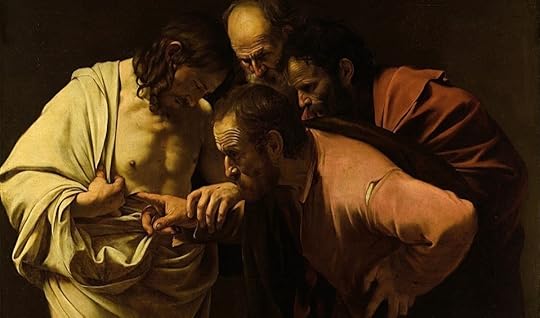
Caravaggio
The outstanding NT scholar of our generation has decided it’s optional for Christians to believe Jesus rose from the dead in bodily form. He says, “I have friends who I am quite sure are Christians who do not believe in the bodily resurrection.”
Some things are so foolish that only a scholar could believe them.
Paul says in 1 Corinthians 15, if Christ hasn’t risen, our faith is useless and we’re still dead in our sins.
For twelve months, I’ve been visiting movements around the world and writing up the stories for my next book. The men and women of faith I meet are not sitting around wondering if it’s ok to stop believing in Christ’s resurrection. They are not debating whether they should uphold Scripture on sex and marriage. They’re not spending years discussing these issues.
The brothers and sisters in Iran, Laos, India, Lebanon, or Northern Nigeria wake up every day wondering if today there will be a knock at the door. Wondering if they will be deprived of their freedom, or worse.
The disciples on death row and maximum security in the Texas prison system aren’t debating how they can disobey the teachings of Jesus on sex. Instead, they’re holding each other accountable to honor him with their bodies. They’re appealing to those who want to step out of darkness into his glorious light.
These are disciple making movements on the rise. They know God honors his Word and blesses obedience. God’s future belongs to them.
They know they do not have the option to deny the resurrection and still say we’re following Jesus. Religious institutions love to question the teaching of Scripture, fall into line with the culture, and run headlong into destruction.
May 22, 2025
350-The Texas Prison Movement
A brief but powerful update from Don Waybright on the movement behind bars in Texas.
May 18, 2025
The Secret Sauce of Movements

It takes the wrong sort of commitment to spent eight years in solitary rather than renounce your membership of the Aryan Brotherhood.
Troop was lost. Lost to his wife. Lost to his mother and son. Lost to himself. Lost to the world. God rescued him out of darkness. Christ died for his many sins. Christ rose to give him new life. Troop is a miracle of God’s grace.
For most of his life Troop had been a “believer.” Christ was his “Savior,” but his faith was not genuine, it was never expressed in obedience.
With Christ as his Savior and Lord, Troop endured another six years of solitary and a life and death struggle with cancer.
I love what his praying grandmother told him, “You're not going to quit! I don't care what the doctor said. You're going back to get treatment and let Jesus do what Jesus does!”
God rescued this man and is recreating him in the image of his Son. It takes time. There are no shortcuts. It’s slow.
Movements multiply because there are so many Troop stories happening at the same time.
Trained in some simple tools and strategies Troop went back into maximum security, and onto death row as a disciple maker and church planter. Now gang members, murderers and rapists are beginning the same journey out of darkness, and they’re bringing others with them. They’re gathering around God’s Word. They’re ministering to their neighbors.
A movement of God is a work of God through his Word and the Holy Spirit. It’s a miracle. Yet God uses a man like Troop sitting alone in solitary, day after day, for so many years. Waiting.
Previously: 349-Troop’s Story
May 14, 2025
The Heart of a Movement

If you want to learn about movements, follow the stories of changed lives. If there’s no stories, it may not be a movement of God. This story comes from my interview with Troop .
Troop admits, “Most of my life has been a calamity of drug addiction and alcoholism, gangs and prison. My gang was the Aryan Brotherhood.”
“When I got out of prison I tried to build a life without God. But I would always go back to drugs, looking to fill the void. My parents, my wife, would ask, ‘Why do you do that? Why do you come out, climb back on a mountain, and just jump back up in a grave?’ I had no answer.
When he committed a capital offense, two jurors blocked the death penalty and the judged sentenced him to 40 years. He’ll come up for parole when he’s 77.
For joining the Aryan Brotherhood, Terry was put in solitary for eight years. He lived in a concrete cell, for twenty-three hours each day. He got one hour a day alone in the day room.
While he was in jail his mother passed away and his sixteen-year-old son passed away. Troop felt alone in the world with no reason to go on. He thought about suicide but then he remembered Jesus from his youth. His parents never went to church, but they had sent him. Alone in his cell he knelt and prayed, “God you’re going to have to do this. I can’t do it. If you’re real, show me.”
He laid back in his bunk. Something changed.
“I felt God say, ‘You've been saying you know me for a long time but you ain't never followed me.’ So I got up from my bunk and I just started throwing sin out under my door. Dozens of pornographic magazines.”
“My neighbors called out, ‘What you doing?’ I yelled, ‘Leave me alone!’ I had surrendered.”
He began reading God’s Word and his life started changing. The desire for drugs was gone. He knew His whole life he’d been missing a relationship with his Creator.
To get out of solitary a gang member has to go through a program called Gang Renunciation And Disassociation (GRAD). There’s a long waiting list. It took Troop another six years to get in.
During that time he was diagnosed with stage four cancer. He spent a year in the prison hospital and weighed just 120 pounds. The cancer was all over his body. He was placed in the hospice.
Cancer didn’t bother Troop. “Even though I was struggling with chemotherapy and throwing up every day, lost all my hair, even my teeth started falling out from nerve damage from the chemo. I was at peace for the first time in my life. I wanted to go and be with Jesus.”
“But my praying grandmother showed up and she said, ‘You're not going to quit! I don't care what the doctor said. You're going to go back and get treatment and let Jesus do what Jesus does.’” He agreed.
Troop remembers, “When my cancer was cured, I wasn't happy. I told God, I don’t deserve this! Why not heal some child that hasn't done anything wrong?
When he finished the GRAD program, and after eight years in solitary, he was released back into prison life. It was hard.
“Solitary felt like Jonah in the belly of a whale. When the whale finally spat me out, I had some choices to make. I was still in prison. I didn't know about discipleship. I didn't know that God had a plan for my life. I didn’t know that God wanted me to tell others about him.”
“Then I heard that was a seminary starting in the Darrington unit. I could earn a bachelor’s degree in Biblical studies. This is what I’d been praying for, a chance to grow in my understanding of the Bible.”
“The studies answered so many of my questions and taught me, some of my questions don’t even have answers. I caught a vision to change the prison through spreading the gospel.”
“I was a poor high school student, but God gave me a desire to study and I made good grades at seminary. God was molding and shaping me. He gave me a group of brothers who invested in me. They loved me. Something I’d never experienced.”
“The whole time, I knew what I wanted to do. God was leading me back where I’d come from — to the gang members in solitary.”
Three years later, I was one of the first tier walkers ministering to the guys in solitary — the troublemakers, the gang leaders, the drug dealers, the violent men. Just like I’d was.”
May 7, 2025
349-Troop’s Story
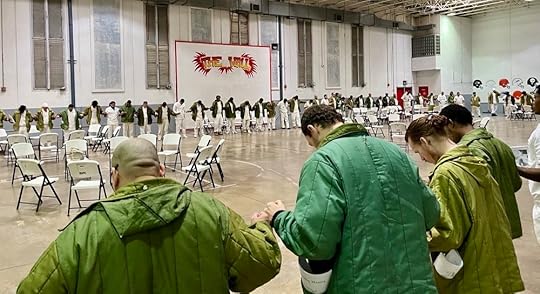
One man’s story paints the picture of a movement of God behind bars in Texas.
April 28, 2025
What Are We Missing?
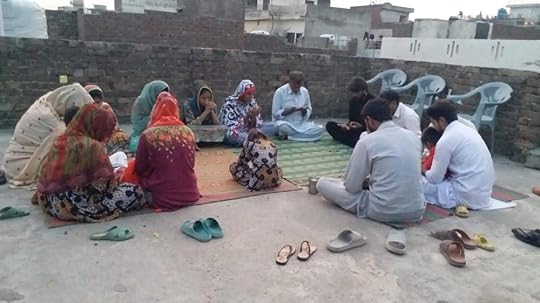
For the last six months I’ve been on the road visiting locations where disciples and churches are multiplying to the glory of God. Watching and learning. Listening and wondering. In my mind, I’m building a picture of what it is that distinguishes these movements.
In Rajasthan, India about 80% of the disciples in one movement are out making disciples and planting churches. Among them there is an elderly woman, left for dead by the side of the road and rescued by the disciples because that’s what they do. She can’t read or write, but she can pray and share her story.
I met a woman widowed by her husband’s murder in Laos. When he was murdered, God called her to continue his work, which she has for the last twenty years. She trains and coaches teams, making disciples and planting churches. She’s a tiger.
It’s a movement when insiders are leading. And where does their motivation originate?
I kept hearing this same story. We were miserable, Dad was a violent drunkard. They came in Jesus’ name. Now we go and do the same.
These are not churches *for* the poor, they are churches *of* the poor. They go with their story, God’s story and the offer to learn how to follow Jesus by reading the Bible together. They minister out of the fullness of what God has done for them. They go in obedience to Christ’s command and he goes with them. The gospel brings transformation. When your drunkard husband becomes a man of God, your whole world changes, regardless of what political and cultural system you’re under. Sometimes communities are transformed to some measure, more often, the gospel stirs up persecution and suffering.
I’ve met so many who have been beaten, imprisoned, threatened, their homes burned down. One family of three disappeared and has never been seen again.
Around the world, these disciples suffer under the Communists, Islamists and Hindu nationalists. The secret of their resilience is the presence of Christ. He promised persecution and he promised his presence. That’s the source of their courage in the face of fear.
Which better reflects the movement of God in Acts? Our experience or theirs?
April 24, 2025
348-Zeke’s Story

We hear from Zeke, a movement catalyst in Indonesia with thirty-five generations of disciples and churches.
I wrote this reflection just after the interview.
April 23, 2025
Like climbing into their morning shower!

I’ve been in SE Asia learning from the movements of disciples and churches. Discovering the price that is paid in terms of persecution from family, other religions and government.
It changes you to hear the stories of these brothers and sisters who suffer rejection, violence, imprisonment and death for the sake of the gospel.
Yet most missional conversations in the West ignore what God is doing in these faraway places. They feel they have nothing to learn, despite their lack of new disciples and new churches.
Then this text came in from a friend, now serving somewhere in the Muslim world,
“I was once asked to come and do a few sessions on evangelism with a group of missionaries in London. Over lunch, we planned to head out and share the gospel. The participants were not happy about this and wanted to “people watch” instead and to “observe the culture.”
One guy said, “Talking to a stranger on the street in London feels wrong, like I’ve overstepped a boundary. It would be like climbing into their morning shower.”
My friend didn’t go back for day two.”
Wherever we find multiplying movements, the gospel goes out with confidence, boldness and openness. It hasn’t changed from Acts.
But somehow, our “missional movements” in the West feel they can defy the example of Jesus and the patterns of Acts and trust that the fish will jump into the boat by themselves. Or perhaps they’ve redefined what the gospel is and lost confidence in the foolish message of the Cross.
God uses this world's weak and foolish things to shame the wise.
April 2, 2025
Church Goes to the Dogs (again)
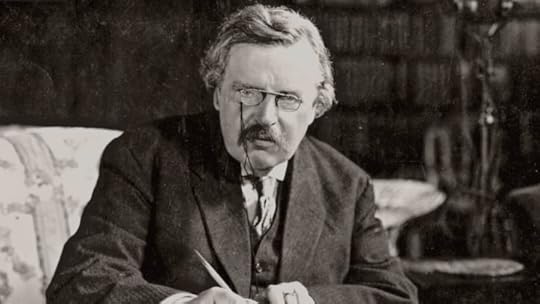
GK Chesterton
Twenty years ago today, I launched this blog with this article. My understanding of movements has come a long way, but this is still a good place to start.
“On five occasions in history the Church has gone to the dogs, but on each occasion, it was the dogs that died.”
GK Chesterton
If Chesterton were alive today I have no doubt he would be writing about the sixth occasion. In this generation will it be the dogs that die? Will the Church be transformed to overcome the challenges we face? Leonard Sweet observes that, in the postmodern world the old maps are obsolete. We're going to have to construct new ones as we go. Although the terrain is unexplored, we are not without a compass. Others have faced this challenge.
Jacques Ellul described the whole history of the Church as the history of the reformation of the Church by the Spirit. Paul Pierson contends that in the renewal and expansion of the Church, the breakthroughs always occur on the fringe of ecclesiastical power never at the center. In every generation, in some obscure place, God is beginning something new that will one day impact the center.
That something new can invariably be described as a "movement". By "movement" I am referring to any group of people called by God who are dedicated to pursuing individual and corporate transformation; resulting in the renewal and expansion of the Church in its mission. Throughout church history there has been an incredible diversity of renewal movements, each making their unique contribution. The most effective share five common characteristics.
1. White-hot faith
A sixteen-year-old boy is taken captive by raiders and sold into slavery. Desperate with loneliness, hunger and cold he cries out to God for deliverance and is answered. He goes on to pioneer one of the greatest missionary movements the world has ever seen.
An obscure Augustinian monk agonizes over what it means to be made right with God through faith. His is an intensely personal struggle out of which the Protestant Reformation is born.
A young minister returns from the mission field, a failure in his own eyes, devoid of the experience of God's loving acceptance. His heart is "strangely warmed" by the grace of God and one of the most significant awakenings in modern history shakes Britain and spreads worldwide.
Patrick of Ireland, Martin Luther and John Wesley—we remember them as powerful historical figures through whom God renewed the Church and transformed the world. We honour them as heroes of the faith. We forget they began as broken men crying out to God for an encounter that would change their lives. Out of personal encounter with God, these transformational leaders went on to renew the Church and to shape the world in which we live.
2. Commitment to a Cause
We all seek to avoid the tension created by the gap between our ideals and our reality. Effective movements exploit that gap and raise the tension. They make life uncomfortable for us all. Movements are uncompromising. They heighten tension inside the Church and with the surrounding culture. Movements are born in conflict because they stand for something.
Australians are cynical when it comes to religion. But in Australia the Salvation Army has a 98% approval rating. That's pretty good considering God polls at only 72%! It has taken generations to build that respect. How did the Salvation Army begin as a renewal movement? They began with the same Church and societal opposition that the early Methodists and Pentecostals faced. They were mocked in the Press, they were beaten by gangs, their meetings were disrupted, their buildings burnt down.
Passionate people make history. That's true for both social and religious movements. They take their cause seriously. They have a clear message that is communicated unambiguously and lived out consistently. The result is often dramatic growth.
3. Contagious Relationships
Changed lives are at the heart of every rapidly spreading religious movement. Lives are impacted, friends and family are influenced. New converts become doors through which the Gospel enters into previously unreached social networks. Sociologically, "Conversion is adopting the faith of your friends."
A key to the incredible growth of Pentecostalism in the 20th Century has been its tendency to grow via face-to-face recruitment by committed individuals using their own pre-existing, significant social relationships. Today, the impact of the Alpha program around the world is attributable to that same dynamic—the spread of the Gospel, from life to life.
A simple, supernatural message of salvation; lives are transformed; and the Gospel spreads like wildfire throughout networks of relationships. The cycle begins again as new converts are quickly deployed in ministry.
4. Rapid Mobilisation
George Bernard Shaw observed, “Every profession is a conspiracy against the laity." It's not that movements abolish the clergy. Rather they abolish the laity. Everyone is ordained and mobilized for ministry.
In 1776 just 17% of the Americans were affiliated with a church. By 1850 that number had grown to 34%. The change can be attributed to the dramatic success the "upstart" Baptists and Methodists had in reaching unchurched people on the frontier. The Baptists and Methodists were led by poorly educated, poorly paid "amateurs" who closely resembled the people they served. In contrast, the sophisticated clergy of the established churches were not trained to earn their livings behind horse and plow, nor were they prepared to spend half their days in the saddle going from one rural hamlet to another.
The Baptists and Methodists planted churches where the people were and empowered them to take responsibility for the ministry. A rapidly changing environment demands that new models for leadership development be implemented. The rest is history.
5. Adaptive Methods
Unencumbered by tradition, movements feel free to experiment with new forms of the church and new effective methods of ministry.
Religious organizations are notoriously difficult to change. Over time our methodologies become even more sacred than our message. In contrast, dynamic movements are characterized by "sanctified pragmatism." They are conservative in doctrine but radical in methodology. When John Wesley first encountered field preaching as a means of mass communication, he was offended. Yet, as he was increasingly shut out of the churches of the day he became an ardent practitioner. "I love the rites and ceremonies of the Church. But I see, well-pleased, that our great Lord can work without them."
Movements adapt themselves to the world around them. They pioneer new and effective strategies without compromising their message.
Conclusion
All around us we see the evidence that the Church as a human institution is in continual decline and decay. Today, much of the Church is still grappling with what mission looks like in the modern world and has no idea of the deep social changes that are being ushered in by the emergence of postmodernity. History offers no guarantees that the Church in its current form will survive.
The uncomfortable reality is that "It belongs to the very life of the people of God that it must accept again and again to have its life renewed by a new confrontation with its Lord and his holy will." The Church is the body of Christ, the temple of the living God who renews His people by His Spirit. This experience of death and new life will continue in the Church until the day when there is a new heaven and a new earth and the Holy City, the new Jerusalem, will come down out of heaven from God, prepared as a bride beautifully dressed for her husband.
Until that day, let's dream together of what the Church can become and refuse to put our money on the dogs.
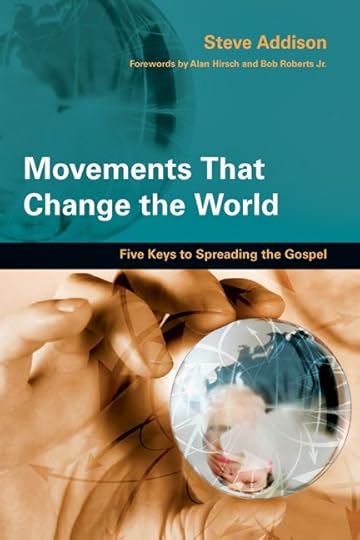
These five keys became the basis of Movements that Change the World.



